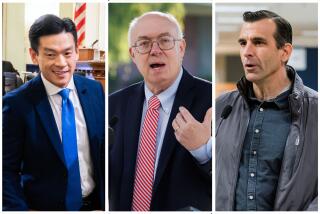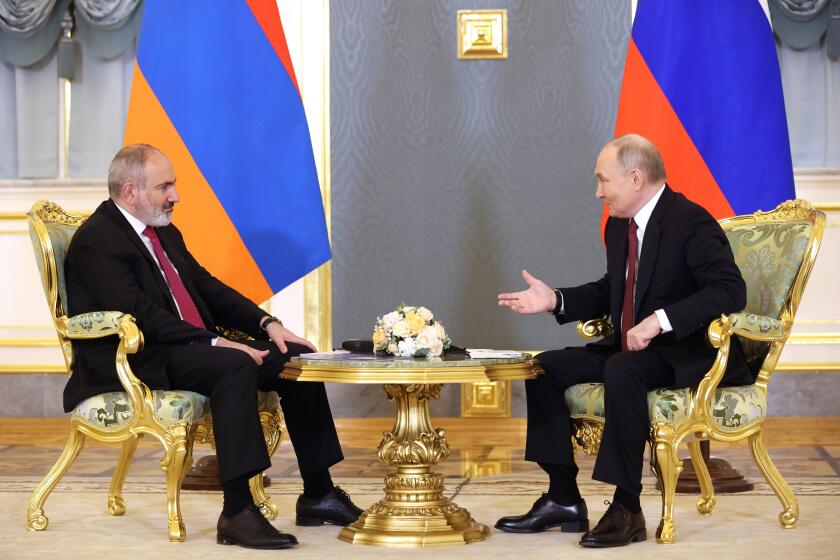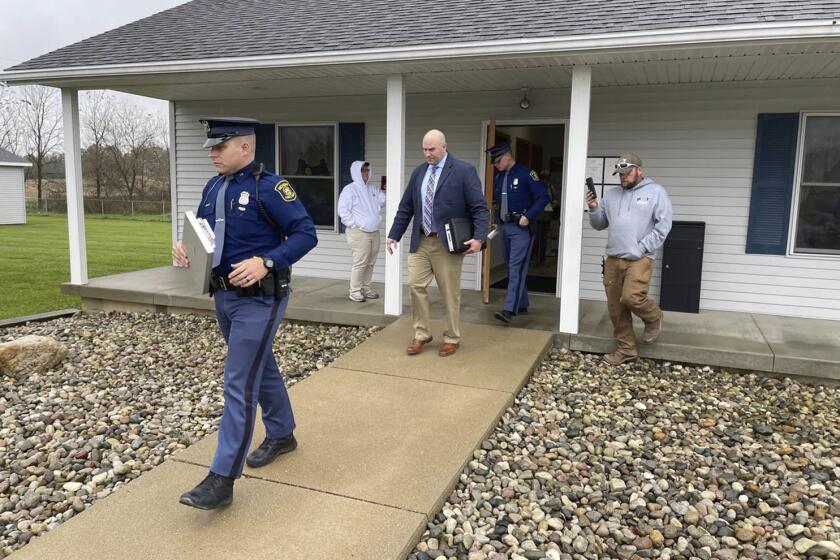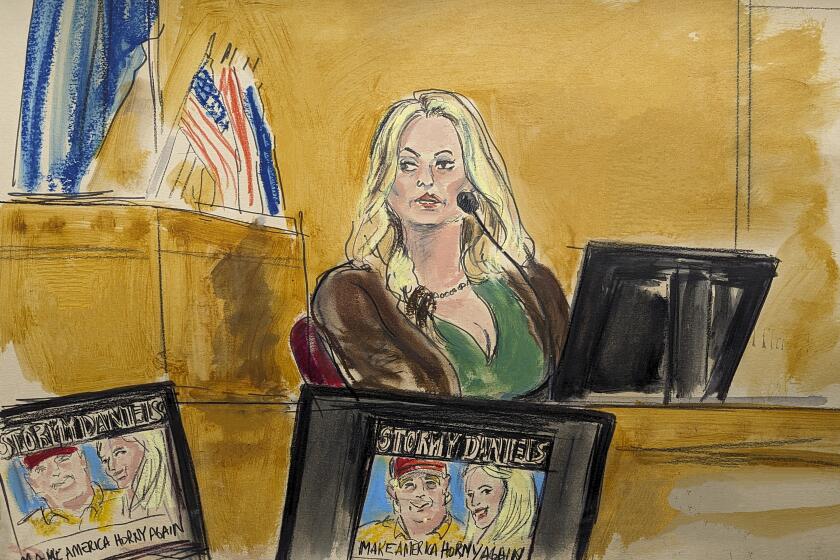Out of the Frying Pan, Into His Diplomatic Element
John D. Negroponte, the U.S. representative to the United Nations, has spent many recent afternoons behind closed doors at the Security Council, wrangling over marching orders for a peacekeeping force to serve in Afghanistan and new rules for trade sanctions against Iraq.
On most evenings, he makes strategic appearances at diplomatic receptions, charity functions and private foreign policy forums.
For the record:
12:00 a.m. Dec. 22, 2001 FOR THE RECORD
Los Angeles Times Saturday December 22, 2001 Home Edition Part A Part A Page 2 A2 Desk 2 inches; 42 words Type of Material: Correction
U.N. ambassador--A profile of the U.S. ambassador to the United Nations, John D. Negroponte, published in Section A on Dec. 16, mislabeled one of his predecessors in the post as Adlai Stevenson III. Adlai Stevenson II was the U.N. envoy. His son, Adlai Stevenson III, was a U.S. senator from Illinois.
But his mornings are often devoted to what Negroponte may do best: the one-on-one meetings that are the cornerstone of his methodical quest to build support for the Bush administration’s war on terrorism. In less than three months on the job, Negroponte has met privately with 75 of his counterparts from the 188 other countries represented here, and he is steadily working his way down the list.
“This is very different than bilateral diplomacy,” Negroponte, a five-time ambassador, said in a recent interview. “It is a little more like being in a parliament, because you have to maintain many, many multiple relationships simultaneously. You cannot focus on just a very few key contacts.”
Negroponte is not a media-savvy exponent of public diplomacy, in the manner of many predecessors. To the extent that he is known to most Americans, it is as the protagonist in a bitter nomination battle that reopened Cold War policy rifts and cast an unflattering light on his past diplomatic performance.
But he has gained respect here as a skilled advocate for U.S. interests, foreign diplomats say, pointing to the administration’s success in winning support for its campaign in Afghanistan. “He is an outstanding professional, and though he had no experience in multinational diplomacy you would never know that,” said Jean-David Levitte, France’s U.N. representative. “He got off to an excellent start, even a remarkable start.”
At the United Nations, friends and colleagues agree, Negroponte is back in his element, showing few signs of stress after perhaps the most intense three months of a diplomatic career that began in the Eisenhower administration.
That may be because the job has been less stressful than the process that got him here, they say.
On Sept. 10, Negroponte was in the sixth month of a bruising confirmation fight. The Senate Foreign Relations Committee was planning a vote on his nomination in the next few days, and that morning he officially submitted a brief for his candidacy, pledging to work for U.N. reforms and other standard U.S. policy goals.
His letter made no direct reference to the main issue holding up the appointment: his tenure two decades earlier as U.S. envoy to Honduras, which had come under harsh scrutiny from the Democrats who control the committee.
Negroponte served in Honduras during a period marked by sharp increases in U.S. aid to that nation’s military. His critics asserted that he willfully overlooked the killings of leftist activists by military-backed death squads. Embassy human rights reports were skewed to protect both Honduras and the secret U.S. arming of Nicaraguan rebels based there, his opponents also charged. Several of his Senate inquisitors were openly skeptical of his contention that he remained “to this day” unaware of any such death squad activities.
The envoy’s defenders--many of them former peers, superiors and deputies--argued that Negroponte was attacked for carrying out the Reagan administration’s Central America policy, which it was his responsibility to uphold.
While under fire from the left, Negroponte was seen by some as a victim of benign neglect from the Republican right, which had not made U.S. representation at the world body its highest priority. The Bush administration had stripped the U.N. job of Cabinet status, and the post had been vacant since January. Secretary of State Colin L. Powell was pushing hard for Negroponte, his onetime deputy at the National Security Council, but with few visibly energized allies.
The way the confirmation was going, some U.N. veterans thought the post might remain unoccupied for months longer. Then the world changed on Sept. 11, and John Negroponte’s situation changed along with it. Anxious to marshal U.N. support for a response to the attacks, the Foreign Relations Committee approved his nomination two days later with just three dissenting votes. The Senate quickly confirmed him without opposition.
On Sept. 19, he was in New York, presenting his credentials to U.N. Secretary-General Kofi Annan and urging the Security Council to pass sweeping anti-terrorism measures. Before the end of September, he had secured the backing of Russia and China for Security Council Resolution 1373, a call for all U.N. members to take immediate action against global terrorist networks and to report back in 90 days.
“That was quite a baptism of fire for me,” Negroponte said in the recent interview, one of the few he has given since his nomination. “[Resolution] 1373 was a key goal for us, and we were very gratified that we were able to get it through in record time, in four or five days, after I had been on the job about 10 days.”
With the U.S. public supportive of the administration’s counterterror initiatives, Negroponte’s former adversaries in Congress do not appear eager to revisit the confirmation fight. Sen. Joseph R. Biden Jr. (D-Del.), chairman of the Foreign Relations Committee, who ultimately voted to approve the nomination, believes that Negroponte “is doing a fine job at the U.N.,” said Norm Kurz, a spokesman for the senator.
Negroponte, not surprisingly, also wants to put the controversy behind him. He notes with a tight smile that he has survived six confirmation hearings and that in each case his nomination was approved unanimously. Nor does he believe that diplomatic confirmations have become too grueling and politicized. “If you want to serve in these kinds of jobs,” he said, “you have to be willing to run the hazards of the nomination process.”
Still, it is clear that this last confirmation left scars. Negroponte is a carefully modulated man, with the diplomat’s gift for seeming candid while revealing little. But he still smolders over the public challenge to his integrity, and questions about his critics prompt rare flashes of anger. “No one who knew me personally associated themselves with any of the criticisms that were made,” he asserted, his voice rising and each word slowing to a crisply punctuated halt. “Not . . . one . . . single . . . individual. You cannot find one.”
It is hard to find critics here at the U.N., a bastion of realpolitik beneath a veneer of diplomatic politesse. In Washington, the rifts over the Negroponte confirmation mirrored deeper divisions about past U.S. policy in Central America and Southeast Asia. But at the world body, many veterans saw it less as a principled foreign policy dispute than a partisan tussle.
For some envoys here, who note that it took the Senate more than a year to confirm the previous U.S. ambassador, these protracted hearings are evidence of American disdain for the United Nations. And in some celebrated cases, that disdain appeared to be shared by the U.S. ambassadors themselves.
Negroponte “is seen as one of us,” said a veteran European diplomat, who requested anonymity to avoid appearing critical of the envoy’s high-profile predecessors. Decades of diplomacy abroad have left the U.S. ambassador with a wealth of contacts here. He moves easily in the corridors, speaking French to West Africans, Spanish to Latin Americans, Greek to the Greeks. (His family roots are in Greece, and he once served in a consulate there.) His wife is English and equally cosmopolitan, and they are the parents of five adopted Honduran children.
Not all of his diplomatic encounters here have been friendly: On the day U.S. forces began their aerial assault on the Taliban, Negroponte called on the Iraqi ambassador. “The message was: Please don’t miscalculate, don’t seek to take advantage of the situation in any way, shape or form,” he recalled telling the Iraqis. “And it was said in no uncertain terms. It left no doubt about how strongly we would react.”
Though a political appointee, Negroponte considers himself a professional diplomat, a policy emissary rather than a policymaker.
That alone distinguishes him from most previous occupants of the post, he noted, gesturing toward the photographs lining the hallway at the U.S. mission here. It is an impressive gallery of political and foreign policy stars, from Adlai E. Stevenson III and Arthur J. Goldberg to Daniel Patrick Moynihan, Andrew Young and Jeane J. Kirkpatrick. It includes President Bush’s father, former President George Bush. “If you look up and down that row of pictures, you can count the number of career officers on the fingers of one hand, and I would count myself among them,” he said.
At the end of the corridor are Negroponte’s immediate predecessors--Madeleine Albright, Bill Richardson and Richard Holbrooke--who were perceived here as positioning themselves for bigger things in Washington.
Negroponte, who harbors no such aspirations, argues that the U.S. representative should not be a Cabinet member but should act instead as a lieutenant and conduit to the secretary of State. With Negroponte, colleagues say, that’s the case. “He may not have a hotline to the White House, but he definitely has a hotline to Powell,” said a foreign diplomat who requested anonymity.
On Capitol Hill, even before Sept. 11, many Democrats were unwilling to oppose Negroponte, out of deference to Powell, whom they saw as a moderate in the Bush administration on such issues as a proposed missile defense system.
Negroponte also benefited from the support of Holbrooke, a longtime friend. Holbrooke devoted much of his time as U.N. representative during the last 17 months of the Clinton administration to bridge-building between the body and its congressional critics.
But the central transformation of the U.S. relationship with the world body is the shared trauma over the attacks that killed thousands of people just a few miles from here.
“The fact these attacks occurred in New York--it touched all the delegations, it affected them very much,” Negroponte said. “They may not identify as total New Yorkers, but still they identified, no question about it. And they still do.”
More to Read
Get the L.A. Times Politics newsletter
Deeply reported insights into legislation, politics and policy from Sacramento, Washington and beyond. In your inbox three times per week.
You may occasionally receive promotional content from the Los Angeles Times.





